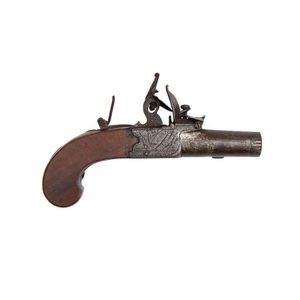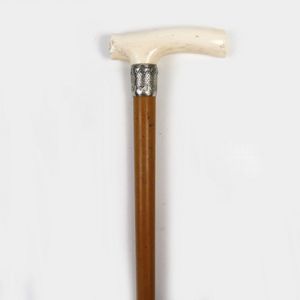Monogrammed Ivory Handle Walking Stick
You must be a subscriber, and be logged in to view price and dealer details.
Subscribe Now to view actual auction price for this item
When you subscribe, you have the option of setting the currency in which to display prices to $Au, $US, $NZ or Stg.
- Embossed / Repousse - Embossing, also known as repousse, is the technique of decorating metal with raised designs, by pressing or beating out the design from the reverse side of the object.It is the opposite of chasing, where the decoration is applied from the front. An embossed or repoussed object may have chasing applied to finish off the design.
- Ivory - Ivory is a hard white material that comes from the tusks of elephants, mammoth, walrus and boar, or from the teeth of hippopotamus and whales. The ivory from the African elephant is the most prized source of ivory. Although the mammoth is extinct, tusks are still being unearthed in Russia and offered for sale.
Ivory has been used since the earliest times as a material for sculpture of small items, both in Europe and the east, principally China and Japan.
In Asia ivory has been carved for netsuke, seals, okimono, card cases, fan supports, animals and other figures and even as carved tusks.
In the last 200 years in Europe ivory has been used to carve figures, for elaborate tankards, snuff boxes, cane handles, embroidery and sewing accessories, in jewellery and as inlay on furniture. Its more practical uses include being used for billiard balls, buttons, and a veneers on the top of piano keys.
The use and trade of elephant ivory have become controversial because they have contributed to Due to the decline in elephant populations because of the trade in ivory, the Asian elephant was placed on Appendix One of the Convention on International Trade in Endangered Species (CITES), in 1975, and in January 1990, the African elephant was similarly listed. Under Appendix One, international trade in Asian or African elephant ivory between member countries is forbidden. Unlike trade in elephant tusks, trade in mammoth tusks is legal.
Since the invention of plastics, there have been many attempts to create an artificial ivory
This item has been included into following indexes:
-
walking sticks and canes, material
- ivory or ivory mounted 222
- silver mounted 454
- walking sticks and canes, types - walking canes 325
Visually similar items

An antique ring, featuring an emerald cut dark blue sapphire, with two small diamonds on each shoulders, set in palladium. Size O. Weight 2.6g.

Fancy silver gilt and pearl drop earrings

The Art Treasures of the Vatican in solid sterling silver 100 sterling silver medallions to Commemorate the 500th anniversary of the founding of the Vatican Museum number 2760 with fitted chest (AF) trays have warped medal diameter 50 mm, weight: 31gms tot

A flintlock pocket pistol by Henry Nock of London, circa 1800, 15 cm. Provenance: Property originally of Thomas Scott (1800-1855), Mt Morriston Tasmania,
